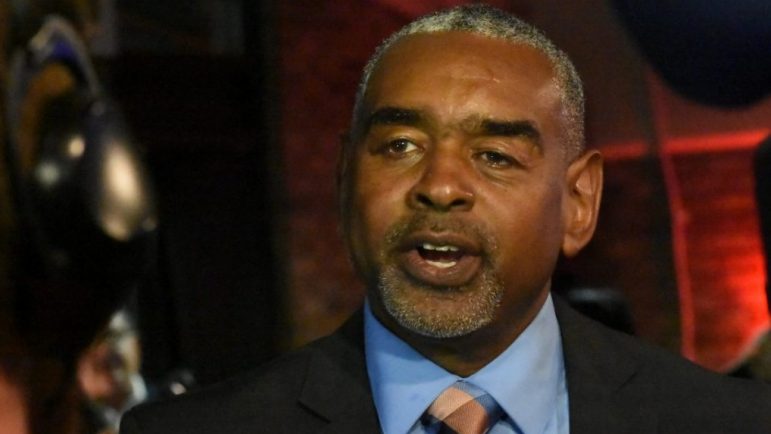By Ginny MacDonald and Solomon Crenshaw Jr.
Jefferson County’s first black sheriff and district attorney were swept into office Tuesday on a wave of Democratic straight-ticket voting.
Votes from the county’s Republican strongholds were not enough to combat the unusually high number of Democrats casting straight-party ballots, votes from inner-city Birmingham, votes by dissatisfied Democrats in the county’s larger cities and possibly votes by Republican women protesting President Donald Trump.
“I think the numbers say that straight-ticket voting greatly benefited the Democrats more than Republicans,” said Jefferson County Board of Registrars Chairman Barry Stephenson.
Democratic straight-party ballots cast outnumbered Republican straight-party ballots by about 40,000, Stephenson said.
“That’s impossible to overcome,” he said.
In the sheriff’s race, Democrat Mark Pettway got 131,026 votes, or 51.4 percent of the total. Of those, 83 percent were straight-ticket votes.
His opponent, incumbent Republican Mike Hale, got 123,745 votes, for 48.5 percent of total votes cast, with 58 percent of his votes being straight ticket.
The same held true in the district attorney’s race, where voters decided between Democrat Danny Carr, who held the office for a few months last year, and Republican Mike Anderton, who is in the office now.
Stephenson said the district attorney’s race was different from the sheriff’s race because Carr had held the office and, “from what everybody tells me, did a really good job as an interim district attorney. He actually had experience in the actual office.”
As had Anderton.
“You’ve got over 80 percent of all Democrat votes that were cast were straight ticket and about 58 percent of all Republican votes cast were straight ticket. So one party greatly benefits from that,” Stephenson said.
Why Straight-Ticket This Year
The explanation is simple, said University of Alabama at Birmingham professor and political analyst Larry Powell.
The Democrats in Jefferson County voted a straight ticket because of a combination of things: to show Trump that they do not support the Republicans, and because it is easier to vote the straight ticket, he said.
“Republicans frequently vote straight ticket in Jefferson County, but it is not that way across the state,” Powell said. “But the Democrats were stronger with the straight ticket (Tuesday). And Republican women who do not like Trump were more prone to vote one-by-one, assessing the ballot.”
The female vote may account for less straight-ticket voting and a higher number of Democratic votes in two cities: Homewood and Hoover.
Political analyst Natalie Davis agrees: “Your suburban, educated women in those areas are not open to simply pulling the lever.”
“We used to be a one-party state statewide and now it’s flipped to a one-party state the other way,” Stephenson said. “But certain counties, battleground counties, are one way or the other. The parties make arguments on both sides.”
Davis said she had thought Tuesday’s election would be a transitional one to the two-party system in the state. “I was wrong. I don’t think the Democrats made a dent in the possibility of this state becoming a two-party state.”
There was transition in Texas, but not here, she said. A two-party system in the state will not come soon.
“People my age will have to drop dead, because the younger voters are more open to two parties. That’s the chance that the Democrats will catch up. You cannot persuade the older Republican voters to change,” Davis said.
Democrats Dominated
The Republican strongholds of Mountain Brook and Vestavia Hills, along with smaller cities and rural areas, were not strong enough to counter the straight-ticket voting at inner-city Birmingham precincts and the large number of dissatisfied voters in the county’s larger cities.
A review of the county’s 182 polling places found Carr and Pettway taking as much as 97 percent to 99 percent of the vote at the Legion Field precinct in Birmingham.
The Democratic vote remained in the 90th percentile at smaller Birmingham precincts, such as Hooper City, Five Points West and North Avondale.
In precincts with more voters, the vote tally was not as high for Carr and Pettway, but the candidates won.
For example, more than 60 percent of the voters at Highland Park went for the two Democrats; at the Glen Iris precinct, Carr got 83 percent of the vote and Pettway 63 percent.
All precincts in Mountain Brook and Vestavia Hills went Republican. All in Bessemer went Democratic.
In Hoover, most polling places went Republican, though the polling place at the city Parks and Recreation Department did not.
Jefferson County’s rural and smaller-city precincts remained Republican strongholds, including Alliance, Corner, Oak Grove, Sylvan Sprigs, West Jefferson, Mulga, Warrior and Mount Olive. So did the larger cities of Gardendale, Trussville and Fultondale.
“We had almost 255,000 people vote, so it was the biggest governor’s election that I can ever recall,” Stephenson said. “I think, based on the last two election cycles, 2016 and 2018, you’d have to say Jefferson County is more Democrat now.”

